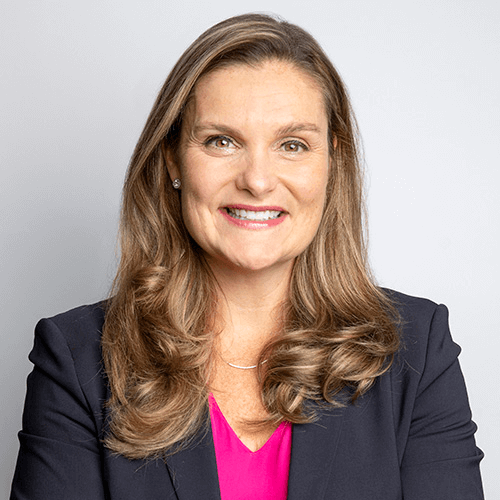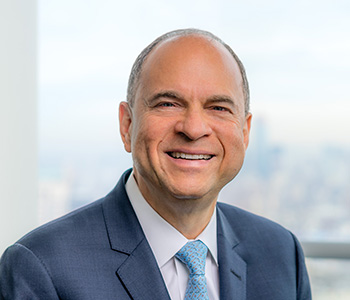Best known as a top global index provider, MSCI offers critical decision support tools and services for the global investment community.
CEO and Chairman Henry Fernandez has helmed the company for almost three decades. Before leading MSCI’s transition to becoming a fully independent public company in 2007, he was a managing director at MSCI’s former parent, Morgan Stanley.
At RBC Capital Markets’ Financial Institutions Conference, Henry joined Lindsay Patrick, Head of Strategy, Marketing, & Sustainability, to discuss MSCI’s latest advances in expanding data analytics for ESG and climate risk.
Can you tell us about the process of spinning out MSCI as its own entity? Was ESG and climate always in the roadmap?
Some 30-plus years ago, when I was at Morgan Stanley, I convinced senior management to help me lead a new business venture to offer tools and models for the investment industry spanning performance, asset location, and risk.
While building this business in the late 90s, I moved to Geneva, where a lot of our Scandinavian clients had been asking us for investment indexes that were “socially responsible.” It was through this that I discovered that a lot of these non-financial environmental and social risks were not being priced into assets around the world, resulting in the misallocation of capital. As an economist, I have always been concerned with the efficient allocation of capital and asset pricing.
That’s what we are doing today. MSCI’s goal is to provide investment professionals with the ESG and climate analytics that they need in their fiduciary duty to achieve the highest risk-adjusted returns, and in that, pricing assets and allocating capital properly.
"MSCI’s goal is to provide investment professionals with the ESG and climate analytics that they need in their fiduciary duty to achieve the highest risk-adjusted returns, and in that, pricing assets and allocating capital properly.”
At MSCI, you consider ESG and climate separately – why have you chosen that approach?
When you engage in a conversation with somebody on ESG, they could be talking about anything ranging from the environment, to social issues, to corporate governance. Within that, climate is just one factor of the environmental pillar.
In its current state, climate change supersedes every other aspect of ESG. You could be having an “ESG” conversation that is entirely about climate. We realized we needed to break climate out of ESG to create its own pillar and product set, because over time climate is going to be the mother of all transformations.
ESG has become highly politicized – how are you guiding MSCI through that?
In America right now, it’s sad that the retirement savings of citizens are being weaponized. They’re trying to force investment managers to ignore non-financial investment criteria like ESG and climate in their investment decisions. In the long run, those people are not going to perform well in their investment returns.
We have to speak the truth, regardless of the consequences. MSCI is doing that, and sometimes we don’t align ourselves with either the left or the right as a result. We can’t let parts of society dictate what is best for the allocation of capital.
“We have to speak the truth, regardless of the consequences… We can’t let parts of society dictate what is best for the allocation of capital.”
What’s the next evolution of data to provide further transparency for your customers?
In terms of coverage, MSCI now has the largest database of private asset classes in the world, covering about $15 trillion of underlying assets.
On the technology side, we’ve been using predictive AI for about 10 years. Now we’re using generative AI. That’s going to be an incredible godsend, because we’ll be able to gather a lot more data faster, check the quality more accurately, and then store and search it more efficiently. We’re very excited about the new discoveries.
Our dream is to put our products and services in front of clients, and also offer them the brainpower equivalent of 100 PhDs trained on their portfolios, enabling insights and predictive capabilities previously unimaginable.
MSCI recently acquired Trove Research, a specialist in the voluntary carbon markets. Tell us about your plans in that area.
The two key functions of markets are to transfer value and to transfer risk. We are very limited in our decarbonization efforts without these two functions. Voluntary carbon markets must be part of the solution to decarbonize the world.
Research from Trove (which is now MSCI Carbon Markets) found that, on average, the companies that use carbon credits most aggressively are likely to decarbonize two times faster than the ones that do not use credits. That refutes all of the naysayers who say carbon credits create a “license to pollute.”
As we look to the future, Trove was a leader in this space. They have analyzed 15,000 global carbon offset projects. MSCI is about to launch our rating system on those projects. Our goal is to give investors a transparent view of the total transition plan of a company, covering the credits that they use and their decarbonization efforts.
You launched the MSCI Sustainability Institute at Climate Week in New York last year. Why is that initiative important to you?
Climate change is a fast-moving problem. We don’t have the luxury of waiting a very long time to come up with solutions. We need to convene and debate the best way to tackle these problems. We created the MSCI Sustainability Institute to do precisely that by engaging academics, NGOs, thinktanks and policymakers.
The world is too siloed, as well. My first time at a COP was COP26 in Glasgow. I was shocked that it was not until the 26th convening year that they invited investment and finance companies. The world also runs on capital, not on policy alone. We need private sector stakeholders at the table too.
I am often asked why climate action is important to me. Don’t get me wrong, I’m not an environmentalist; I’m actually a conservative fellow. I tell my conservative friends that if the private sector doesn’t try to solve some of these problems, climate change is going to be the mother of all socializing factors in the world. The physical consequences will become so bad that citizens are going to demand their elected officials do something about it, and they’re going to come up with highly prescriptive policies.
We’re the generation that has been stuck with this problem. We need to rise to the responsibility and tackle it.
“[If] the private sector doesn’t try to solve some of these problems, climate change is going to be the mother of all socializing factors in the world.”

Lindsay Patrick
Head of Strategy, Marketing and Sustainability

Henry Fernandez
CEO, MSCI